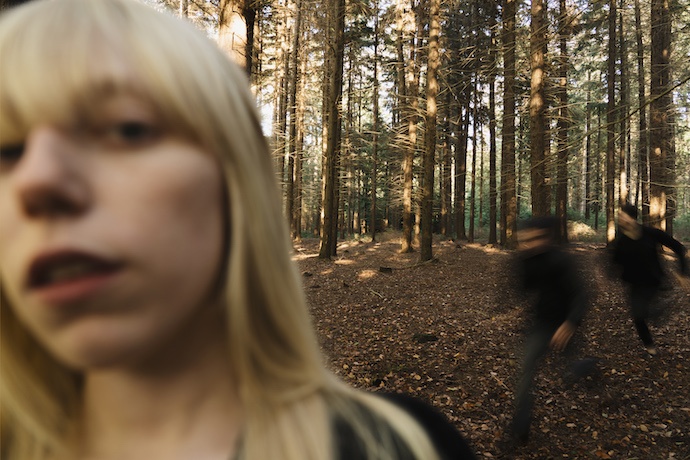
Coincidentally, while thinking about how to introduce our premiere of Ainsoph‘s debut album (which will be released by Wolves Of Hades on February 2nd), I paused to finish an essay I had been reading about the great American songwriter Cole Porter. It ended with this paragraph:
“All art aspires to the condition of music, Walter Pater wrote; within music itself, all music dreams of becoming another kind of music. Art songs dream of becoming pop songs and pop songs dream of becoming folk songs, too familiar to need an author. We hear Porter now without knowing that it’s Porter we’re hearing. Like Stephen Foster, he sublimated his suffering into his songs, until the songs are all we have, thereby achieving every artist’s dream, to cease to be a suffering self and become just one of those things we share.”
What does this have to do with Ainsoph and their album Ω – V? I don’t want to push the connections too strongly, but some of the phrases in what I just quoted seemed relevant to what I was thinking about this album.
Ideas about the emptiness of human existence, about the endless void that will consume us all, and perhaps abut the search for meaning, or at least the embrace of endlessness, seem to have played a role in inspiring the album. In its own way, it seems a sublimation of suffering into music, both expressing it and transcending it. And in its own way, it’s also music that seems to dream of becoming another kind of music.
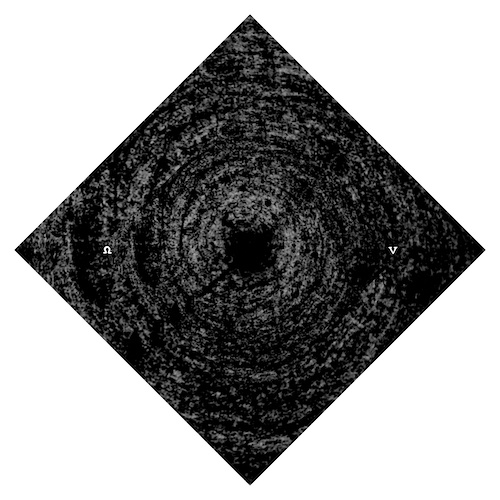
Contemplation of the void, both within and without, both the fear of it and the attraction to it, has animated quite a lot of heavy music, particularly at the more extreme ends of the spectrum. Based on what we’ve been told about Ω – V, such thoughts seem to have been ingredients in its creation as well — though as you will discover, the musical ingredients aren’t commonplace. Ainsoph explain:
It’s a very exciting moment for us.
The record in its entirety functions as an aural representation of a feeling of endless spiraling emptyness,
The intense longing for rest, completion and that which lies beyond, the fearless mindset required to course the trail towards the long dream and last but not least, one of the many reasons some of us chose this beaten track.
We hope all is well with anyone who this material speaks to.
The contemplation of an all-devouring nothingness and the search for life’s meaning while in the shadow of such inner emptiness and outward endlessness find expression in extreme metal, but the music of this Dutch trio doesn’t fit comfortably under that label, or really under any convenient label. It may not be music that “dreams of becoming another kind of music”, in the sense intended by the author quoted above, but it’s certainly not constrained by any rigid stylistic boundaries.
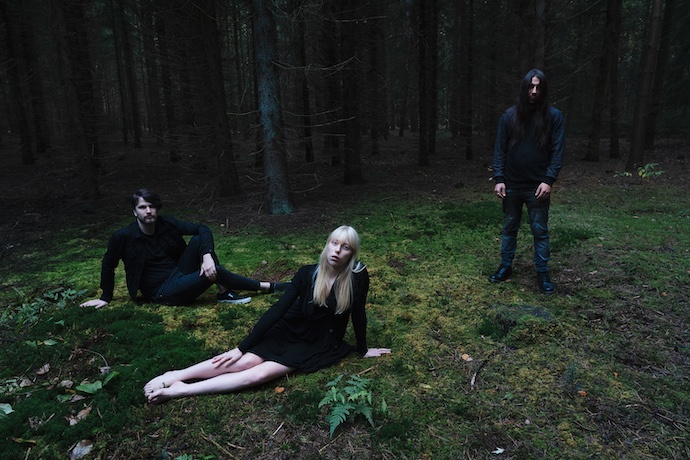
I heard the album’s opening track “Home” before the rest of the album was available to me. It made a striking first impression. A stylistic hybrid that molds together ingredients from post-punk and black metal, with progressive and even jazzy flourishes, the song is a big, urgent, high-energy head-mover, but also entrancing, and pleasingly mercurial in its course. The vocals themselves have a dreamy, wraithlike, yet intense quality, while the extended guitar solo near the end is a fast-flickering and swirling starburst that helps send the song out on a high point.
“Home” is a contagious experience. In a way, it was hard to get past it into the rest of the album, because just playing it again and again was so tempting. It turns out that many of the other songs are contagions themselves.
The beefy, vibrant bass pulse in “Home” and the inventive, shape-shifting drum patterns reappear in other adrenaline-fueled cuts like “Spiral” (where blast-beats and raking riffs are intertwined with post-punk cadences and ethereal, chiming guitars, as well as manifestations of rampant chaos) and “Less Than Beast” (which is dissonant and disturbing, as well as brazen and boisterous — and physically compulsive), and the vocalist’s intense wails and entrancing croons are a vital presence throughout.
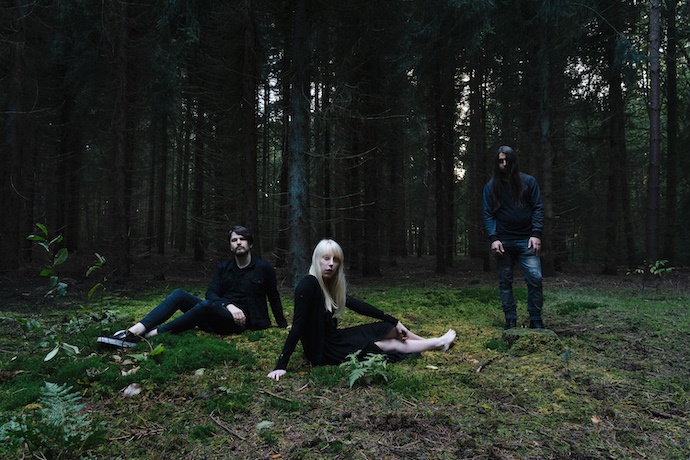
But the ebb and flow of the album does indeed take the music into the abyss, or at least to its edge. “Malkuth” is slow in its pacing, clobbering in its heaviness, and despairing in its mood. Also slow in its pacing, the purely instrumental track “Back to Purgatory” is perhaps the most jazz-influenced of the songs, with eerie, hallucinatory melodies expressed through a fascinating range of instrumentation, including moody bass tones and something whose sounds resemble a vibraphone or a mellotron or a Rhodes piano (those tones reappear in other tracks).
On the other hand, “The Long and Self-Destructive Road” builds gradually, and morphs. Its enthralling opening sequence, which conveys tension and mystery, leads into increasing intensity as the drums hammer, tremolo’d chords race, and that wraithlike voice soars. Yet as the song surges and recedes, the peals of the guitar and the alien glimmering of keys are magical and mesmerizing. The moods of the song also change dramatically, descending into anguish.
Ainsoph‘s attraction to musical influences that span many decades and a cornucopia of styles is evident throughout that album (this interview names some of them), all the way through the closer, “Maggot Brain“. There, Ainsoph shine a spotlight on the guitarist, who delivers a spectacular performance that mines certain veins of ’70s prog-rock (and made this listener think of Jeff Beck in particular, even though if my memory had been better it should have made me think ofEddie Hazel and Funkadelic, who recorded the significantly longer original in 1971).
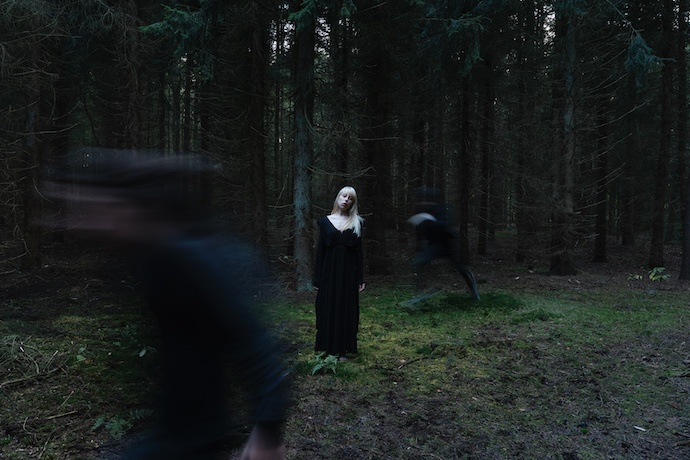
Ω – V is less extreme than most of the music we tend to traffic in at this site, but it is far more than a temporary diversion or a passing peculiarity. It’s an unusual and remarkably accomplished achievement that holds the promise of a lasting fascination. For this writer, it’s one of the brightest discoveries of the new year, and undoubtedly will still be shining at year-end.
I wish I could tell you more about the band’s three members and their musical backgrounds, but they haven’t divulged much, or at least not that I’ve found. The line-up is identified as:
M.T. – drums
T.D. – guitar, bass, and keys
I.V. – vocals
To repeat, Wolves Of Hades will release the album on February 2nd on vinyl LP and digitally.
PRE-ORDER:
https://wolvesofhades.com/shop/pre-order-ainsoph-o-v-12-vinyl/
https://wolvesofhades.bandcamp.com/album/v
AINSOPH:
https://www.facebook.com/ainsophband/

a hearty FUCK YES to this!
i’m hearing pieces of Oathbreaker, Killing Joke, and Virus.
this is a weird one, I’m in.
Not bad. definitely worth another listen. A pretty decent cover of ‘Maggot Brain’. Nice guitar sound. Still doesn’t top the original though.
I think that’s usually the case when it comes to topping the original. But they did I great job nonetheless. Love the blend of genres & atmosphere on this album